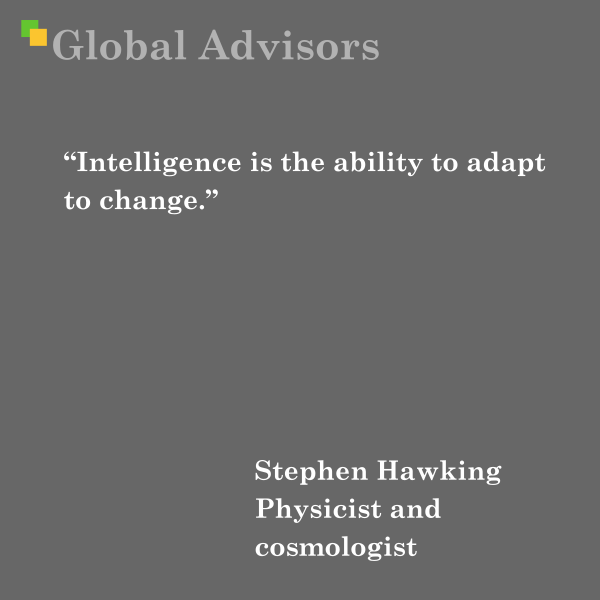“Intelligence is the ability to adapt to change.” – Stephen Hawking – Physicist and cosmologist
This statement encapsulates a distilled truth at the heart of human ingenuity: adaptability, rather than the rote accumulation of facts or the mastery of a single discipline, lies at the core of true intelligence. Stephen Hawking’s own life and work stand as a testament to this principle.
Stephen Hawking: Context and Backstory of the Quote
Stephen Hawking (1942–2018) was one of the world’s most celebrated theoretical physicists and cosmologists. He is renowned for his pioneering work on black holes and the origins of the universe, formulating the concept of Hawking radiation, which revealed that black holes emit energy and can eventually evaporate—a proposition that altered the trajectory of modern physics. Hawking’s pursuit of unifying Einstein’s theory of general relativity and the principles of quantum mechanics led to profound insights into cosmic singularity and the nature of time itself.
Hawking’s achievements are made even more remarkable by the profound personal adversity he endured. Diagnosed with amyotrophic lateral sclerosis (ALS), a progressive and ultimately paralysing motor neurone disease, in his early twenties, he was told he would live only a few years. Instead, he persisted for more than five decades, revolutionising scientific understanding while losing nearly all voluntary muscle control. Communicating by cheek muscle and wheelchair-bound, Hawking continued to lecture, collaborate, and write, making science accessible to millions through books like A Brief History of Time, which remained on bestseller lists for years and became a cultural touchstone.
His quote captures the ethos by which he lived and worked: in the face of both scientific puzzles and personal obstacles, adaptability is critical, not only for survival but for progress and innovation. The ability to adapt, thrive, and reshape oneself and one’s approach in the face of uncertainty marks both individual and organisational brilliance.
Intellectual Lineage: Theorists and Thinkers on Adaptability
The idea at the heart of Hawking’s quote—that intelligence is intertwined with adaptability—draws on a rich intellectual tradition that spans biology, psychology, management, and physics:
-
Charles Darwin: Darwin’s theory of evolution by natural selection hinges on the notion that survival depends on the ability to adapt to changing environments, not on innate strength or intelligence. His frequently paraphrased insight, “It is not the strongest of the species that survives, nor the most intelligent; it is the one most adaptable to change,” underscores adaptability as the driving force of progress in life itself.
-
Jean Piaget: In cognitive psychology, Piaget positioned adaptation as central to intellectual development. He defined intelligence as the ability to adapt one’s thinking to new experiences and to reorganise mental structures in light of novel information, introducing concepts such as assimilation and accommodation.
-
Herbert Simon: A Nobel laureate and pioneer of organisational and management theory, Simon argued that rationality and intelligence are bounded, and what marks effective decision-makers—whether individuals or firms—is their capacity to adapt strategies as environments shift.
-
Peter Drucker: The father of modern management foresaw the increasing need for “knowledge workers” to be able to respond and adapt rapidly in a world of constant discontinuity—a view that prefigures modern agile management. Drucker placed “systematic innovation” and learning at the heart of organisational resilience.
-
Agile Management: Building upon these intellectual roots, agile management emerged in the late 20th and early 21st centuries as a direct response to the complexity and speed of change in business environments. Agile principles emphasise iterative adaptation, learning, and flexibility over rigid planning—a practical embodiment of Hawking’s insight in the corporate arena.
Beyond Hype: The Enduring Value of Adaptability
Hawking’s quote speaks not to fashionable buzzwords or transient management fads, but to an enduring foundation for resilience and progress. In both scientific discovery and practical leadership, the ability to reorient, learn, and respond creatively to change separates those who endure and excel from those who are left behind. Intelligence, in this vital sense, is measured not by static measures of capacity, but by the dynamic ability to evolve.
By internalising this principle, leaders, organisations, and individuals alike come to embody the wisdom of Hawking and his intellectual forebears—always questioning, always learning, and always ready to adapt.


